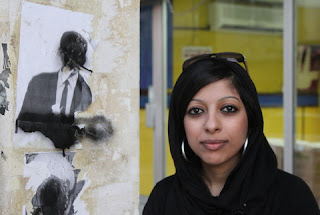As Bahrain continues to face the challenges of Arab
Spring repercussions, this week’s theme of authoritarian governments attempting
to prolong their rule through quasi-democratic institutions struck me as
interesting, and also sadly made me think that Bahrain may be the exception to
the rule. The Bahraini government has made some “attempts” to bring about
justice for the one-sided violence unleashed on protestors beginning in February
and March 2011. But these have done little to appease many protestors, looking
at their actions illustrates how this is true, and also shows how embittering
and relatively hopeless the case in Bahrain seems to be.
Bahraini
human rights activist and frequent political prisoner Zainab al-Khawaja
was participating in a hunger strike from jail in March.[1] In
her letter explaining her reasons for the hunger strike (posted in NYTimes
March 24, 2013), she frequently referenced Dr. Martin Luther King Jr. and how
his message of nonviolent civil disobedience was inspiring her through the
struggle in Bahrain. But there is one passage from her letter that I feel is
particularly insightful:
When
I look into the eyes of Bahraini protesters today, too many times I see that
hope has been replaced by bitterness. It’s the same bitterness Martin Luther
King Jr. saw in the eyes of rioters in the slums of Chicago in 1966. He saw
that the same people who had been leading non-violent protests, who were
willing to be beaten without striking back, were now convinced that violence
was the only language the world understood.
 |
| Zainab al-Khawaja |
That bitterness is being expressed in more than Molotov
cocktails and rocks thrown at security forces. Yesterday (roughly) a car exploded
in the Financial Harbour district of Manama, where security is considered to be
fairly tight.[2]
No one was reported to be injured, but this serves as a new escalation by the “embittered”
perhaps, and is concerning for the regime as the Formula 1 race is scheduled
for Bahrain next week. Many see the F1 races as a legitimizing event for the
regime and there have been many protests and arrests (around 100 according to
BBC article) against the hosting of the F1 race by Bahrain while torture and political
repression and common (see Amnesty International report).[3] A
group calling itself the February 14 Movement (after the initial protests in
2011) has taken responsibility for the explosion and promised more ‘“actions’
in a bid to force the cancellation of the race.”[4] The
protests, both in MLK-esque civil disobedience and now in car bombings, show
that the
lip service the government is giving to “justice” and “responsibility”
for the violent crackdown is not enough. This is an authoritarian regime that
is not giving enough concessions, cooperation, or co-option, but it also may be
one that does not have to.
Why should we care, as students in the United
States? We should care because torture is common for political prisoners in
Bahrain, and some have even died as a result while in custody—we should care on
human rights grounds. We should care because due to the geopolitical situation
(oil, Saudi Arabia, military base) the U.S. government has abandoned the
democratic aspirations of the Bahraini protestors. We should care because of
the potential harm, to Bahrainis and perhaps even people from the U.S. should
the “embittered” continue to escalate the protests into violent acts such as
the recent car bomb. We should care because basic freedoms such as right to
assemble, of speech, of information are being limited.
Gandhi and Przeworski argue in our reading for
Monday, that some faux-democratic institutions help to prolong an authoritarian
regime. The Al-Khalifa regime has attempted some of these actions by opening up
to independent investigation of the violent crackdown on protestors, (even if
they have ignored the findings and made little to no effort to follow through
on them).[5] They
have sentenced two police officers to 10 years for the death of protestors,[6]
amongst others. However many others have also been acquitted.[7]
Even those security forces convicted of murder received 10 years, but 17
protestors were sentenced to 15 years for attempted murder of security forces.[8]
This I feel shows the failure of these attempts at “justice,” and the Bahraini
protestors are not stupid, they see this, and this is part of the reason why,
after over two years, they are not going away.
As far as policy makers, various things “should” be
done, but I find that it is all too idealized to hope for. The Al-Khalifa
regime should promote real justice;
stop sentencing people of “threatening national security” while holding
sit-ins, and have a real investigation into the continued practices of torture
and repression. The U.S. government should
support the opposition’s general democratic aspirations—although that is such
an unlikely possibility that I feel silly writing it out on this page because of
the geopolitical situation (Oil/Saudi Arabia/Military Base). But do they really
have to? With Saudi Arabia’s support, does the Al-Khalifa regime even need to
pretend to have democratic institutions? To me it seems that Bahrain may be a
good counter argument to Gandhi and Przeworski, and shows that with the right
geopolitical situation and powerful friends, a regime need not do much at all
to prolong its rule.
[1] http://kristof.blogs.nytimes.com/2013/03/24/a-letter-from-a-political-prisoner-on-hunger-strike-in-bahrain/
[2]
http://www.bbc.co.uk/news/world-middle-east-22153567
[3] www.amnesty.org/sites/impact.amnesty.org/files/PUBLIC/AI-Bahrain-report-mde110622012.pdf
[4] http://www.bbc.co.uk/news/world-middle-east-22153567
[5]
www.amnesty.org/sites/impact.amnesty.org/files/PUBLIC/AI-Bahrain-report-mde110622012.pdf
“While the BICI report was used
by the Bahraini authorities as a narrative of change, in reality
the facade of reform crumbled as
human rights violations intensified, the circles of repression
widened to include children and
human rights activists, culminating with a ban on all
protests
at the end of October 2012.” page 4.
[6] http://www.bbc.co.uk/news/world-middle-east-21769901
[7] http://www.bbc.co.uk/news/world-middle-east-21601016
[8] http://www.bbc.co.uk/news/world-middle-east-21834127

This weekend's race seems to have served as a platform for the protestors to show their demands to a global audience (in addition to an attempt by the government to display itself as legitimate). Aljazeera English reports 10,000 protestors (http://www.aljazeera.com/news/middleeast/2013/04/201341919248304805.html) and (http://www.aljazeera.com/news/middleeast/2013/04/201342181930629224.html)
ReplyDeleteAlso, BBC, http://www.bbc.co.uk/news/world-middle-east-22237478